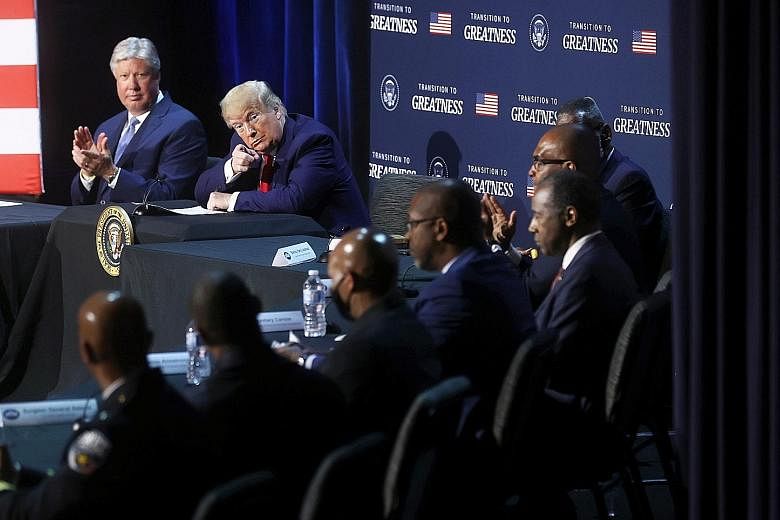DALLAS/SEATTLE • President Donald Trump has rejected calls to overhaul law enforcement or cut officers' funding amid protests over police brutality and racism, and instead backed new training programmes as well as economic development, school choice and improved healthcare in minority communities.
Mr Trump said on Thursday that he was working to finalise an executive order that called for encouraging "police departments nationwide to meet the most current professional standards for the use of force, including tactics for de-escalation". He was speaking in Dallas during a roundtable discussion with supporters, including religious leaders, business owners and law enforcement officials.
But he offered scant details on what those programmes would look like, beyond a pilot programme that could allow social workers to embed with law enforcement.
And he dismissed the concerns raised by many protesters of systemic problems with law enforcement, saying instances of brutality could be chalked up to "bad apples" and there "aren't too many of them".
"We'll take care of our police - we're not defunding police," Mr Trump said.
"We're going to make sure that our police are well trained and... they have the best equipment."
There have been nationwide protests calling for policing reform in the aftermath of the death of Mr George Floyd, an unarmed black man, as he was arrested by police in Minneapolis on May 25.
Mr Trump, who has said he believed the case to be isolated and that it was not evidence of systemic racism in policing, has nevertheless been weighing executive action or legislation to influence law enforcement agencies.
White House spokesman Alyssa Farah tweeted on Thursday that the administration is "working to finalise an executive order that will encourage police departments nationwide to meet the highest standards for the use of force by police officers".
She said that includes "mobilising co-response teams to deal with people who are homeless, on drugs, or dealing with mental health. We will also advise on best practices for hiring, training and community policing".
Mr Trump, who touted his programme to support economic development in low-income communities, said more needs to be done.
"At the heart of this effort is increasing access to capital for small businesses and that's with minority owners in black communities," he said. He added that expanding school choice would lead to improvement in education.
His decision not to focus on racism and brutality among police is likely to fuel the perception that he remains unwilling to grapple with difficult racial issues.
He has limited his comments on the topic recently, focusing instead on his call for a return to "law and order" amid incidents of violence during demonstrations.
He told Fox News on Thursday that the death of Mr Floyd was a "disgrace" and was not representative of a broader problem with the police in the US.
While Mr Trump has said he supports peaceful protests against Mr Floyd's death, critics have seized on his administration's removal of peaceful demonstrators outside the White House last week ahead of a photo op at a nearby church.
In Seattle, Mayor Jenny Durkan said it would be unconstitutional and illegal for Mr Trump to send military forces into the city to clear protesters occupying a neighbourhood, as he suggested.
But she did not say how or when the authorities would remove the roughly 500 demonstrators who have set up a makeshift encampment behind barricades in the Capitol Hill district.
"It is unconstitutional and illegal to send the military into Seattle," said Ms Durkan, a first-term Democrat. "There is no imminent threat of an invasion of Seattle."
Activists have occupied the area since police officers moved street barricades and abandoned their station on Monday in a move which city officials said was aimed to reduce tension. Protesters sectioned off the area, calling it the "Capitol Hill Autonomous Zone".
Mr Trump told Fox News on Thursday: "If we have to go in, we're going to go in. Let the governor do it. He's got great National Guard troops."
Meanwhile, 14 Minneapolis police officers on Thursday denounced former police officer Derek Chauvin who was charged with killing Mr Floyd. They said in a letter that they were prepared to embrace "change, reform and rebuilding".
BLOOMBERG, REUTERS

